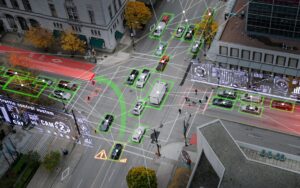The cities of Markham and Vaughan are home to the new $7.3-million Demonstration Zone, the latest addition to the Ontario Vehicle Innovation Network

The OVIN Demonstration Zone will serve as a platform for small and medium-sized enterprises (SMEs) in the province to test, pilot and showcase innovations, such as electric vehicle advancements, integrated mobility solutions, robotics, and connected and autonomous vehicle (CAV) technologies in real-world environments.
The cities of Markham and Vaughan are home to the new $7.3-million Demonstration Zone, the latest addition to the Ontario Vehicle Innovation Network
The Ontario government announced today it is investing $2.5 million via the Ontario Vehicle Innovation Network (OVIN) to launch a Demonstration Zone for automotive and mobility solutions in the cities of Markham and Vaughan.
An additional $3.4 million in private-sector funding and $1.4 million from the host municipalities bring the project’s total capitalization to $7.3 million.
The OVIN Demonstration Zone will serve as a platform for small and medium-sized enterprises (SMEs) in the province to test, pilot and showcase innovations, such as electric vehicle advancements, integrated mobility solutions, robotics, and connected and autonomous vehicle (CAV) technologies in real-world environments.
“What the demonstration zone will do is allow Ontario companies as part of the commercialization process to use real infrastructure, to use real railways and to use real sidewalks or whatever the case may be, to showcase how their technology works,” says Raed Kadri, head of OVIN, in an interview with Electric Autonomy.
“The purpose of the demonstration zone is to really act as a lighthouse that the world knows that all of these companies in Ontario have created the best technology.”
Why Vaughan and Markham?
OVIN is an initiative started by the Ontario government in 2021, as a successor to the Autonomous Vehicle Innovation Network (AVIN). Its mandate is to help the province become a global leader in the automotive sector by building a robust ecosystem and attracting investments.
The Ontario government’s funding for the Demonstration Zone is part of its four-year, $56.4-million commitment to OVIN.
Previously, the city of Stratford served as a demonstration zone under AVIN, allowing the testing of vehicles, autonomous technology, and related infrastructure in live, on-street scenarios. When AVIN concluded, the zone project came to an end as well.
Last fall, OVIN launched a competitive process to find hosts for its new demonstration zone. Markham and Vaughan were selected because both cities have a growing population and are quickly urbanizing their city centres.
“The city of Vaughan and the city of Markham are rapidly transitioning from suburban to urban. We are seeing densification we’re seeing condos built, we’re seeing professionals moving in, we’re seeing all sorts of new pressures on how people move around and this is causing us again to innovate,” says Raphael Costa, director of economic development, City of Vaughan, in an interview with Electric Autonomy.
The Zone’s real-world technology demonstrations will be conducted in designated spaces and infrastructure within Vaughan Metropolitan Centre and Markham Centre, the new downtown hubs of both cities.
While experiencing growth, these cities are also the right size for conducting demonstration testing.
“We’re not like the cities of Toronto or Montreal where it’s often hard for companies to test new technologies with municipalities because of how hard it is to navigate procurement and various departments,” says Chris Rickett, director of economic growth, culture and entrepreneurship at the City of Markham in an interview with Electric Autonomy. “Working with a bit of a smaller municipality that’s a little more focused on making it easy for companies to test and demonstrate technologies, I think, is the other value proposition we bring to the table.”
“Markham and Vaughan also have a fairly large cluster of automotive and technology sectors,” adds Kadri. “They really put together the most compelling story and have brought the right partners and kind of put the right factors in place to meet our needs.”
The Demonstration Zone will operate with a long list of partners, including SmartCentres, Rogers Communications, Syntronic, Honda Canada, AMD, IBM, Qualcomm, Microart Services, Remington Group, PSP Services, York Region, York Region Transit, Toronto Transit Commission (TTC), York University, Alectra, and Seneca-HELIX.
Projects to be tested
Calls for applications from Ontario companies to submit their automotive and smart mobility technologies and solutions for testing in Markham and Vaughan will begin by October.
“We anticipate a large demand,” says Kadri. “I hope that we get so many more than we can do because that means that we really hit the nail on the head on what we’re accomplishing here.”
The call for demonstration projects will take two forms, says Rickett.
The first will be looking for projects, technologies and hardware solutions that will highlight current urban transportation challenges in the cities of Markham and Vaughan, such as last-mile goods and people movement solutions.
According to Rickett, the city of Markham aims to address a gap in its transit system, seeking to establish a connection between the east and west sides of the city.
Concurrently, as a part of Vaughan’s Transportation Innovation Program, the city is dedicated to enhancing Vaughan’s road and street network, advocating for better public transit options, and promoting the improvement of active and emerging modes of transportation.
“A great example is the City of Vaughan’s new Transportation Innovation Program (TIP), which truly harnesses the innovative spirit of our thriving auto-tech sector. When it launches this fall, the TIP will position the city as a testbed for smart mobility innovations,” says Steven Del Duca, mayor of Vaughan to Electric Autonomy.
The second form of projects that will be accepted in the Zone will be “an open call for companies that may have solutions that we weren’t thinking about or different technologies that weren’t even on our radar so we can look at potential applicability and opportunities within each of those zones,” says Rickett.
These could be types of challenges and technology such as micro-mobility solutions, urban robots, charging infrastructure, smart intersection technology and more.






